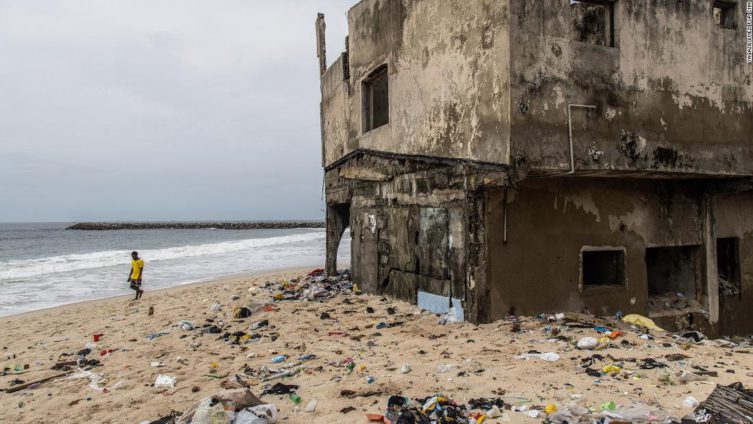Standing on the sand next to a building hollowed out by the churning sea, Sheriff Elegushi points far out into the Atlantic Ocean to where his ancestral home once stood.
"Over there was where we had our tarred road before," Elegushi said. "We also had our electricity poles there and a health center ... You can see the remaining particles," he adds, pointing to the debris.
Elegushi -- a leader in the Okun Alfa community on Nigeria's Lagos Island -- spoke to CNN some 1,500 meters from where Alpha Beach, a popular tourist destination, used to be. The people here no longer even call this stretch of sand Alpha Beach. They consider it long gone.
The resort's extinction has left the Okun Alfa community and those around it paralyzed, and is just one of many losses for the people here, whose neighborhoods have been ravaged by frequent tidal surges fueled both by the climate crisis and questionable urban planning.
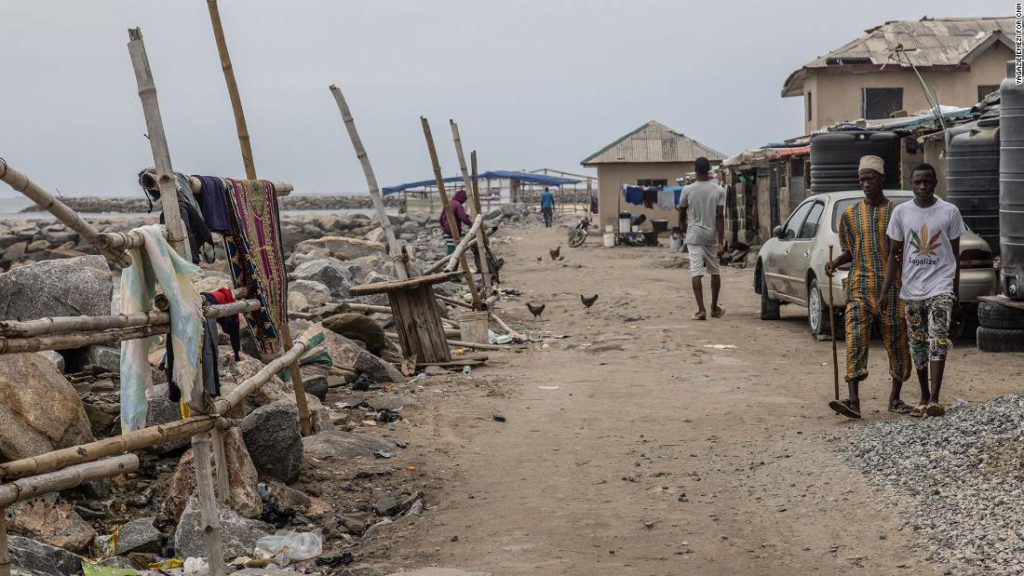
This is no sleepy island, but rather Lagos' buzzing central business district. It is densely packed with residential homes and high-rise buildings. The residents of Okun Alfa worry that complete submersion of their community is no longer a matter of if, but when.
Huge swaths of Okun Alfa's landscape have been consumed by the sea, says the convener of the community's ocean surge response, Oladotun Hassan. It's half the size it once was. Properties that were nowhere near the ocean 10 years ago now sit just a few steps away.
"Many years ago, we took long treks to get to the sea," said Elegushi. "There were no houses close to the shore."
He added that for decades, Okun Alfa's residents have been moving their homes further and further back from the shoreline, as floods and sea level rise erode the coast they once looked out over. But there's a limit to how far back they can move.
"There is no more land for us to move to," said Elegushi.
On Lagos Island, the coastline is even approaching the palace of Okun Alfa's traditional ruler, Chief Elegushi Atewolara Yusuf. And this is his new one -- his older one has already been washed away by the sea.
"I lost my palace. You can see that we just built this (new palace). The former palace is inside the ocean."
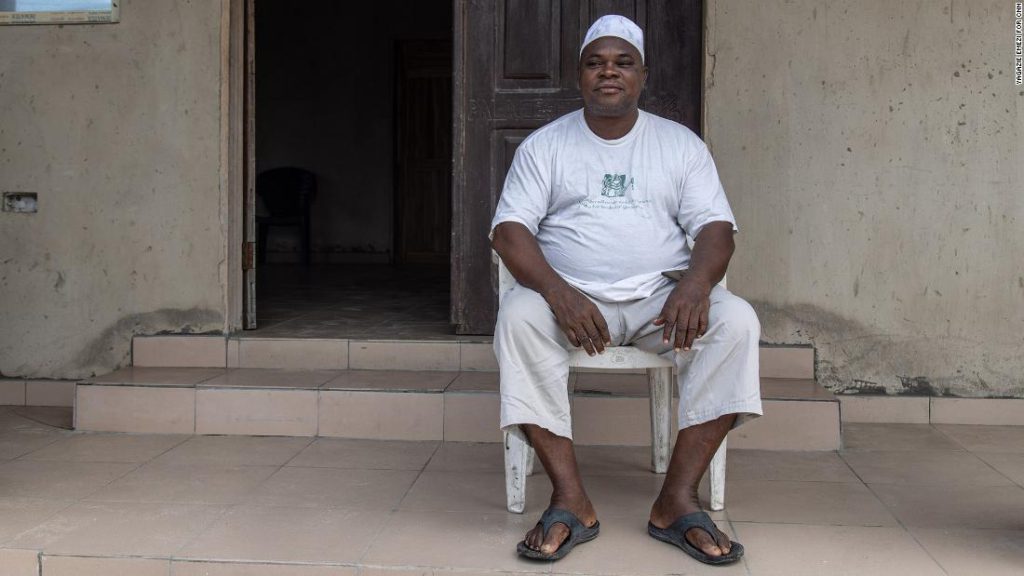
As the COP26 climate talks in Glasgow enter the most intensive phase of negotiations, the money needed for developing nations to adapt to the climate crisis is proving to be one of the most contentious issues.
The COP26 presidency has sought to get rich nations to fill the gap and pay their fair share on a promised $100 billion a year by 2020 for the Global South to adapt to changes like these on Lagos Island.
Industrialized nations have contributed far more to the crisis than developing ones, yet they have missed this target and though more money is being pledged in Glasgow, it is only trickling in.
A problem with management, climate, or both?
A projection on sea-level rise by the University of Plymouth showed that an increase of just 1 to 3 meters "will have a catastrophic effect on the human activities" in Nigeria's coastal environments, including Lagos, a low-lying city on the Atlantic coast. Scientists say that a rise of up to one meter could happen by 2100 if emissions levels do not decrease dramatically.
Another study, published in Nature, found that some of the world's low-lying coastal cities could be permanently submerged by then.
But, like so many of the worst impacts of the climate crisis, humans' management of the natural and built world are exacerbating problems like receding coastlines.
On Lagos Island community leaders fault the construction of an entirely new coastal city, called "Eko Atlantic." They say the project has worsened the surge of water towards their part of the coastline, pushing their homes underwater.
The city is being built on land reclaimed from the Atlantic, on a former beach on Lagos' Victoria Island.
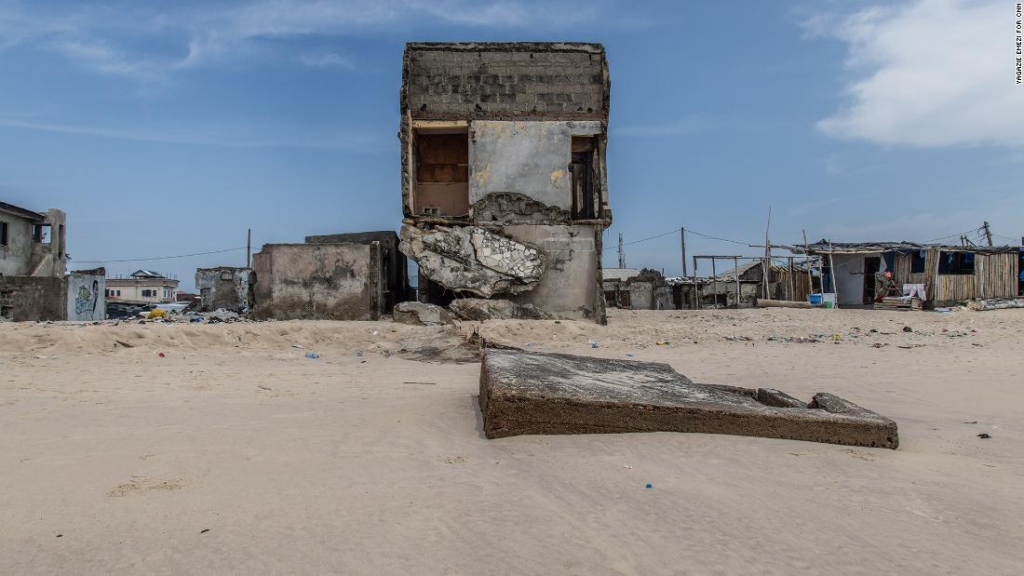
A Nigerian environmental activist, Similade Adeodun, told CNN the construction of Eko Atlantic was making the usual methods of adapting to sea level rise in Okun Alfa more challenging.
"Land reclamation is a major problem in combating rising sea levels and building resilience," said Adeodun. "Eko Atlantic project is pushing the water that was occupying where they are reclaiming now back to neighboring coastal communities ... So this has increased sea surge in places like Okun Alfa. The higher the water goes, the more devastating the impact," he said.
David Frame, the managing director of Eko Atlantic, denies the project is creating these problems.
"That's not the case," said Frame in an interview with CNN. "We engaged consultants to design the structure of the sea wall and the reclamation process of Eko Atlantic, and they have monitored that progress from the beginning."
He explained that the consultants' role was to ensure dredging contractors did not take sand from the seabed beyond a point known as the "Minus 15 Contour."
"That is the point at which, if you dredge closer to the shoreline, you are going to affect the coastline."
He said the method used conformed with international standards.
"So the dredging operation has not caused any erosion on the coastline."
But Tajudeen, another community leader in Okun Alfa, doesn't buy it.
"Eko Atlantic has given us a very serious problem," he said.
"The ocean has been disturbing us; breaking houses including those that are not close to the shore. It just comes and breaks them. Some people built concrete block houses with many rooms but they are now sleeping in makeshift structures made with planks."
Tajudeen told CNN that a protective barrier erected by the government 10 years ago has helped to reduce tidal surges in Okun Alfa.
"After numerous complaints, the government erected breakers in parts of the ocean. Without the breakers, there wouldn't have been anyone left in this village," he said.
But just looking at the barriers, it's clear their construction was never fully completed.
That's why there is still a continuous penetration of seawater into the land, Elegushi said.
"The job was stopped. That's why water is still penetrating. The government promised to do more. This was just half of it," he added.
Another resident, Jidah Saed, said Okun Alfa isn't yet safe.
"When they started the breakers in 2011, the whole idea was to extend it by about 1,000 meters. Unfortunately, they were not able to complete the project. If they had finished it, then we would be safe," Jidah told CNN.
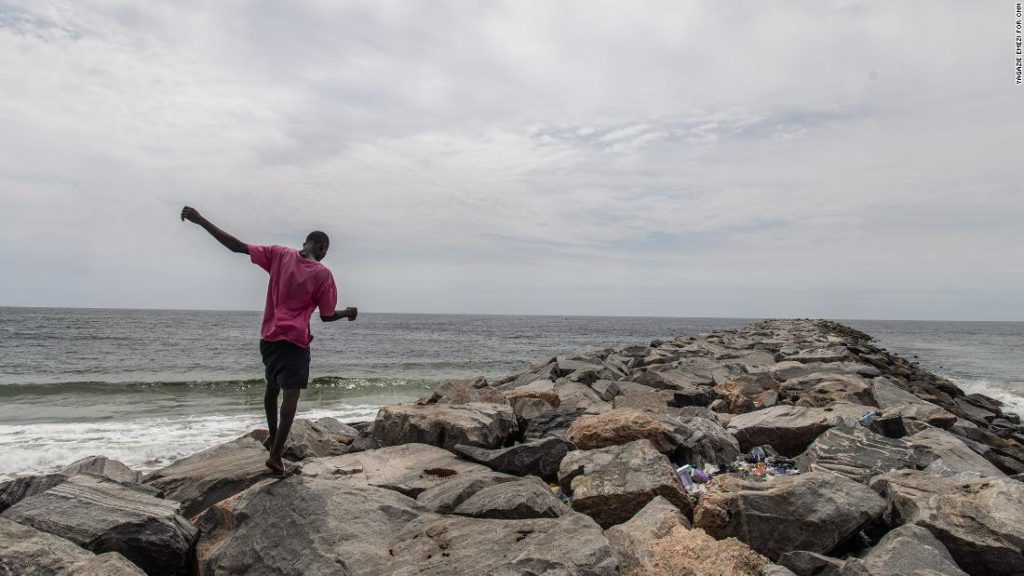
Lagos authorities did not respond to CNN's request for comment but a statement from the Lagos State Government in 2018 said "the construction is a continuous project subject to availability of funds" and urged communities "to fulfil their civic responsibility to the government by paying their taxes promptly."
An official Lagos website published a statement by the state surveyor-general in June saying that Eko Atlantic City "is a unique megacity built on new ideas and innovation for a Greater Lagos that is environmentally friendly and sustainable."
Eko Atlantic developers say the project is a way of preventing parts of Lagos Island from being eaten away by erosion.
"Victoria Island, V.I extension, Phase One Lekki, and the best part of Phase Two of Lekki are protected permanently by Eko Atlantic," said Frame of Eko Atlantic.
Nigeria calls for more foreign climate funding
Okun Alfa's ocean surge response convener Hassan explains that local financing will be insufficient in addressing Nigeria's climate issues. He also cites the need for the country to access more ecological funding.
Garba Shehu, a spokesman for President Muhammadu Buhari, told CNN in a statement that more funding to adapt to problems like receding coastlines was crucial. It has been a key ask from Nigeria at COP26 talks.
"We are 100% committed to the overall (goal) of zero-emissions ... Then, of course, we want the rich nations to fulfill their obligation by paying the $100 billion in the Paris Accord," Sherbu said.
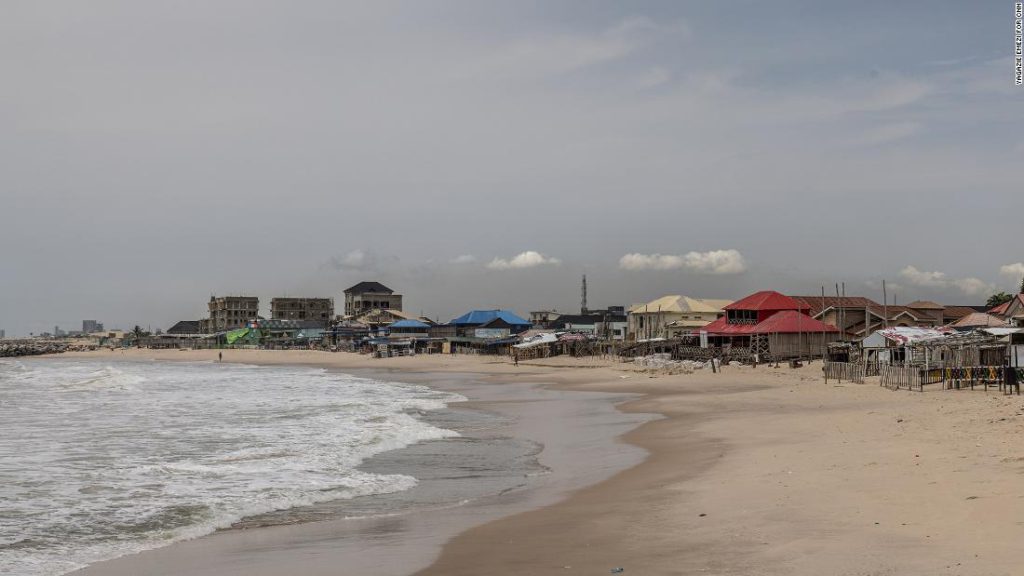
In 2009, developed countries agreed to transfer $100 billion a year by 2020 to developing nations to help them reduce their greenhouse gases and adapt to the climate crisis. That target still hasn't been met and developing nations at COP26 are complaining that not enough of that money is going to adapation.
"We are committed already to 20% reduction (of emissions) as a national objective; with funding support, we are ready for 45% or so by 2030," Shehu added.
Environmentalist Adeodun argued that Nigeria has been unable to receive enough funding for climate adaptation due to "mismanagement" in the country. He is very careful to not say directly where he believes previous funds allocated for Nigeria's efforts have gone.
"Because of mismanagement, Nigeria is unable to access enough funding that will accelerate our resilience and adaptation projects and programs," Adeodun said.
Latest Stories
-
It is possible to live and survive without being corrupt – Prof Bawole
44 seconds -
Liha Miller marries again after rocky split from Patapaa
9 minutes -
NPP’s Amfo Sefa vows to ‘arm up’ for Akwatia
2 hours -
Peace Council condemns Ablekuma North election violence
3 hours -
This is why a judge decided to separate twins sentenced for stealing motorbike
4 hours -
Ablekuma North polls: MFWA condemns violent attacks on 3 journalists
4 hours -
Government addressing port inefficiencies to fuel 24-hour economy – Mahama
5 hours -
Businesses still battling power outages despite government assurances – PEF Boss
6 hours -
Few banks in Ghana facing larger capital gaps – IMF
6 hours -
Ghana’s macroeconomic outlook remains broadly stable
6 hours -
Ghana’s public debt sustainable but still at high-risk of debt distress – IMF
6 hours -
CleanVibeGhana partners with Buzzstop Boys to ignite sanitation revolution through clean-up exercise
7 hours -
Energy Minister engages stakeholders ahead of ENI shutdown
7 hours -
Ghana hosts 4th International Maritime Defense Conference to tackle piracy and transnational crimes
7 hours -
IMF endorses ECG privatisation
9 hours

